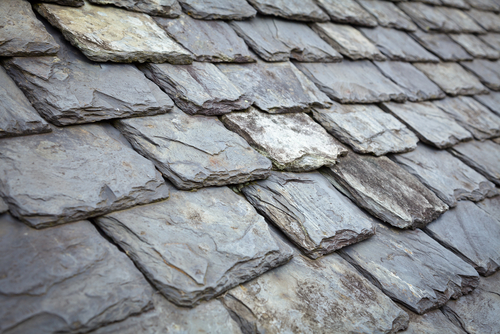
If your roof is looking a bit worse for wear and you have been considering a repair or even a new roof for your London home, you’ll soon discover there are more choices to be made than simply the colour. Your roof can be finished in a wide selection of materials and you’ll need to make the choice between tiles or slates – which may sound rather similar but actually have many differences.
Slate
Natural roofing slate is considered to be one of the best quality roofing materials; formed underground by intense pressure and heat. The chosen fine-grain, metamorphic rocks are split into multiple flat faced, smooth pieces which are used to form slate roofing.
Natural slate is considered an extremely durable material, and when installed correctly, can last up to half a century, protecting your home against water and external elements – with relatively low maintenance required. Repairs can be made with fair ease by professional roofers and the density of slate tiles can help maintain your home’s temperature, preventing energy loss and saving you money on your bills as a result. Natural slate also offers decent fire protection and is unaffected by pest damage and rot.
Slate is typically installed flat against the roof pitch, however, it can be layered to create a textured look – although this can increase the risk of individually broken tiles. Most commonly found in various shades of grey, natural slate is occasionally available in a choice of textures and comes available in a small variation of natural colours.
The disadvantages of using natural slate are minimal, however, due to the high density, it is quite a heavy material for roofing and requires sufficient structural support in place prior to replacing an existing roof to prevent it from collapsing. Imitation slate roofing material has recently become available but will not offer the same properties as natural slate due to the different materials used in manufacture, such as plastic.
Tiles
Most commonly available in concrete and clay, roofing tiles come in a much wider variety of designs and colours than natural roofing slates. Good quality roofing tiles offer similar durability to slates with professional installation. However, concrete tiles are considered more weatherproof and able to withstand severe weather conditions.
Clay tiles are used over concrete where finer roof additions need to be outlined – such as chimneys and skylights – or where structural support isn’t available or cannot be installed to withstand the weight of concrete tiles. Standard roofing tiles tend to be less costly than their slate equivalent, particularly if further structural support needs to be added.
The main disadvantage of tiles (in addition to the weight of concrete tiles) is the increased need to clean them of algae and moss, although this can also depend on your local climate and the chosen finish on your roofing tiles.
Looking at the options available, have you considered what material you would like on your new roof in London? If you require any further information or advice, give our friendly team a call on 020 8291 3388 or send us an email to info@ableroofingsurrey.co.uk.




